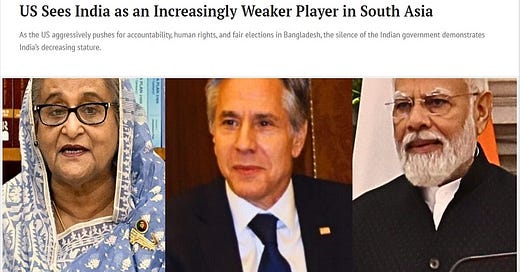Ahmad should reflect on the facts shared in this response to his latest article and correct his assessment of Indian-US ties if he’s honest.
Omair Ahmad, an author and journalist at the popular Indian online outlet TheWire, published a piece on Wednesday declaring that “US Sees India as an Increasingly Weaker Player in South Asia”. In his view, the US’ new visa policy aimed at pressuring Bangladesh’s ruling Awami League ahead of coming national elections supposedly also reveals a lot about America’s real attitude towards India. Here’s how he phrased his primary point:
“We have no idea if India was informed or consulted in any manner. If it was not, that would mean the US sees India as an incidental power in South Asia, and maybe even a barrier to the furtherance of free and fair elections. If the Indian government was informed and consulted, and has kept mum, on both the sanctions on RAB and the new visa policy, it suggests that the government considers itself a secondary actor in its own neighbourhood.”
Ahmad then concluded that both scenarios supposedly prove that “there is not even a premise of equal partnership between ‘the world’s oldest democracy’ and ‘the world’s largest democracy’.” That’s a false assessment, however, which is debunked by their unprecedented defense road map that was just agreed to and the recent start of their strategic trade dialogue. The first will see joint production and technology transfers while the latter will focus on supply chain resilience and other related matters.
No other South Asian state has anything comparable with the US, not even that country’s traditional Pakistani partner. Having clarified that important point regarding the false claim in Ahmad’s conclusion, it’s now time to address the two scenarios that he shared in his piece. Regarding the first, the US has no obligation to inform any country about its ties with another. It therefore shouldn’t be interpreted as a slight that India might not have been informed in advance of the US’ new Bangladeshi visa policy.
As for the second scenario, India’s policy of principled neutrality means that it wouldn’t have spoken out about this anyhow even if it had known ahead of time. Pragmatically declining to take sides in foreign conflicts like the NATO-Russian proxy war and other countries’ bilateral tensions such as the latest Bangladeshi-US ones is a pillar of Indian grand strategy. Its rapid rise as a globally significant Great Power would risk being offset if India abandoned multi-alignment by embracing zero-sum policies instead.
Considering these points, there’s no doubt that Ahmad is flat-out wrong with what he wrote. While there remains some political friction in their ties, the US has nevertheless made it clear that India is its top partner in South Asia and among its most important in the world. Bangladeshi-US tensions have nothing to do with it, and India respects each of those two’s sovereignty enough not to meddle in their bilateral relations. Ahmad should reflect on these facts and correct his assessment of Indian-US ties if he’s honest.




